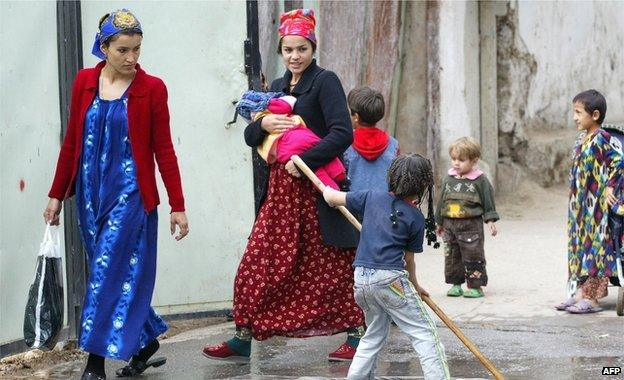Tajikistan: Dushanbe bans 'un-Tajik' black clothes
- Published

Tajikistan's president has said women should wear traditional colourful outfits
The mayor of Tajikistan's capital city has ordered shops to stop selling black clothing for women, in the latest move against Islamic cultural influences in the country.
The mayor of Dushanbe, Mahmadsaid Ubaydulloyev, wants existing stock to be removed from the shelves because he says it doesn't fit with Tajikistan's culture and traditions, the privately-owned Asia-Plus news agency reports, external. He has also told officials to prevent women's garments from being imported if they're black. The move is being seen as part of a broader government campaign against the adoption of Islamic cultural practices in Tajik society, including women wearing black headscarves.
In March, Tajik President Emomali Rahmon used a Mother's Day speech to criticise women who wear "foreign" clothing. Mr Rahmon told a crowd of women's activists that "strangers" were using the clothes "to create another new extremist trend" in Tajikistan. While colourful headscarves are considered traditional in the country, black hijabs are frowned upon, according to the agency. Hijabs were banned in schools and universities in 2005. More than 90% of the Tajik population is Muslim, but atheism was officially encouraged during 70 years of Soviet rule.
It's not just black clothing on officials' minds, though. The justice ministry wants to amend the law to force parents into giving their children traditionally Tajik names. "If the amendments get approved, our offices would refuse to register babies with names that are Arabic or foreign to our culture," ministry official Jaloliddin Rahimov tells the Radio Free Europe website, external.
Next story: New car prizes for law-abiding drivers in Dubai
Use #NewsfromElsewhere to stay up-to-date with our reports via Twitter, external.